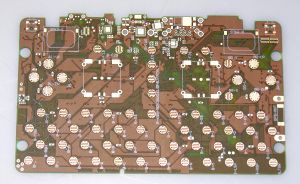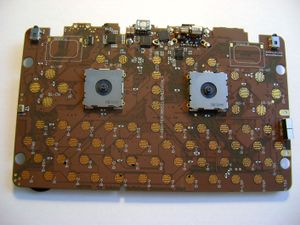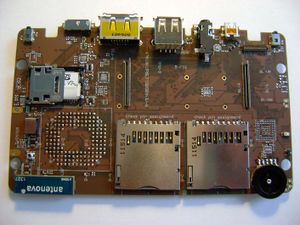Mainboard: Difference between revisions
(expanded on placeholder paragraph) |
mNo edit summary |
||
| Line 1: | Line 1: | ||
This is the largest PCB in the Pyra, with a wide range of different functions. It could be compared to the motherboard in a traditional desktop computer, with the addition of a keyboard and gaming controls on one side. Display-support hardware and the processor itself are each on separate PCBs. | This is the largest PCB in the Pyra, with a wide range of different functions. It could be compared to the motherboard in a traditional desktop computer, with the addition of a keyboard and gaming controls on one side. Display-support hardware (the [[Displayboard]]) and the processor itself (see [[CPU-Board]]) are each on separate PCBs. | ||
There is a space for | |||
The Mainboard includes the following hardware. | |||
==[[Modem]]== | |||
There is a space for an optional [[Modem|WWAN&GPS]] module. This may be populated with various pin-compatible chips designed for different regions, or not at all, depending on which Pyra model you buy. | |||
[[image:Pyra_PCB_baredev.jpg|thumb|Unpopulated development version]] | [[image:Pyra_PCB_baredev.jpg|thumb|Unpopulated development version]] | ||
| Line 9: | Line 13: | ||
Haptic feedback is provided through vibration generated by an electric motor with an unbalanced mass on its driveshaft. | Haptic feedback is provided through vibration generated by an electric motor with an unbalanced mass on its driveshaft. | ||
[http://boards.openpandora.org/uploads/post-1-0-32618500-1406479444.jpeg] | [http://boards.openpandora.org/uploads/post-1-0-32618500-1406479444.jpeg] | ||
==[[Storage]]== | |||
''Main Article: [[Storage]]'' | |||
The [[Mainboard]] includes a combination microSD/SIM card slot which, with the addition of a microSD card, can be used for internal storage up to 200GB. With the addition of two accessible regular-sized SD card slots (each capable of up to 512GB storage), that's 1.2 TB of removable storage. (Only the [[CPU-Board#eMMC|eMMC]] memory is permanently attached to the [[CPU-Board]].) | |||
==Connectivity== | |||
The Pyra connects to [[WiFi]] and [[Bluetooth]] from modules on the Mainboard. | |||
Revision as of 18:22, 4 April 2016
This is the largest PCB in the Pyra, with a wide range of different functions. It could be compared to the motherboard in a traditional desktop computer, with the addition of a keyboard and gaming controls on one side. Display-support hardware (the Displayboard) and the processor itself (see CPU-Board) are each on separate PCBs.
The Mainboard includes the following hardware.
Modem
There is a space for an optional WWAN&GPS module. This may be populated with various pin-compatible chips designed for different regions, or not at all, depending on which Pyra model you buy.



Rumble
Haptic feedback is provided through vibration generated by an electric motor with an unbalanced mass on its driveshaft. [1]
Storage
Main Article: Storage
The Mainboard includes a combination microSD/SIM card slot which, with the addition of a microSD card, can be used for internal storage up to 200GB. With the addition of two accessible regular-sized SD card slots (each capable of up to 512GB storage), that's 1.2 TB of removable storage. (Only the eMMC memory is permanently attached to the CPU-Board.)
Connectivity
The Pyra connects to WiFi and Bluetooth from modules on the Mainboard.